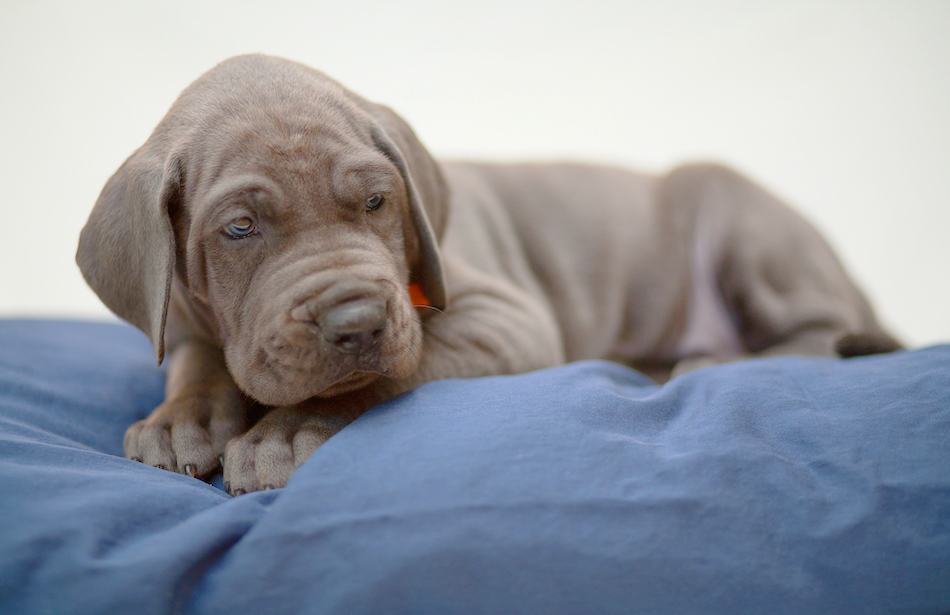
If you have a Great Dane puppy, you may have already realized a few things about this particular breed of dog. They seem somewhat playful, but not quite as much as other breeds, and they are so clumsy!
Maybe it is the big paws and the seemingly inevitable amount of growth that they have to do. Still, many new Great Dane owners begin to wonder if their puppy is sleeping the appropriate amount for a dog their age.
Do Great Dane puppies sleep a lot?
Yes, Great Dane puppies usually will spend a total of 18-20 hours a day sleeping until they reach about three months of age. Much like human babies, puppies need a lot of sleep because their bodies are growing and developing. After that, your pup will still like to sleep around 14 hours a day, even through adulthood.
This seems like an extreme amount of sleep for any animal, especially a puppy that you somewhat expect to be somewhat hyper and even a handful at times.
However, there are many reasons why Great Dane puppies and even adult Great Danes sleep so much, and it is good to know the normal amount of sleep so you can watch out for any signs of illness.
Do Great Dane Puppies Sleep A Lot?
Many dog owners consider their dogs part of their family or even consider it a child of sorts.
When Great Dane’s are puppies, this really is not a comparison that is too far off. Now, all puppies, no matter the breed, will sleep much more than they do when they are an adult dog.
However, Great Danes and other large breed dogs like Mastiffs will sleep even more than other dogs!
Great Dane puppies need more sleep simply because they must grow more than other smaller dog breeds. They will certainly spend plenty of time playing, but sleeping allows the Great Dane puppy’s bodies to catch up, grow, and heal.
Similar to human babies, this is a period where their whole life revolves around the play, eat, sleep, grow, potty, repeat cycle!
However, if they were to skip out on too much of that sleep, they wouldn’t have the proper recovery that enables their “little” bodies to change so drastically.
It may seem strange to you at first when you bring your Great Dane puppy home to let them sleep most of the day, but remember that it is important for healthy growth.
The fact that they sleep a lot makes it much easier for you to monitor them as their awake periods will be far fewer.
Monitoring downtime and playtime with your Great Dane puppy is especially important because they are clumsy and prone to destruction.
How Much Sleep Should Great Dane Puppies Get?
Great Dane puppies can be expected to sleep around 18-20 hours per day until they reach about 3 months in age. This can be alarming when you first bring home your Great Dane puppy as you expect them to be bouncing off the walls and playing all of the time.
After about 3 months of age, they may start to sleep just slightly less, but they may still sleep up to 18 hours. On average, even adult Great Danes will sleep between 14-16 hours daily.
They are regarded as one of the laziest dog breeds, and if you own one or have owned one, you will know that they are complete couch potatoes!
While these gentle giants sleep most of the day, that doesn’t mean they will sleep through the night. Great Dane puppies often have to get up during the night to go to the bathroom.
This can make potty training somewhat difficult unless you are willing to adhere to their sleep schedule. However, if you’re looking for some help on potty training, take a look at our epic guide on how to train a Great Dane.
The fact that your puppy is sleeping away most of the day doesn’t mean that you should leave it alone or in its crate all day.
Great Dane puppies, just like other puppies, need appropriate exercise and brain stimulation via training in order to grow up to be happy, healthy, and functional adult dogs.
Understanding Dogs and Their Sleep Habits
Honestly, all dogs sleep quite a lot. It isn’t uncommon for a dog of any breed to at least take an afternoon nap or two and then still be ready to go to bed at night. This is because dogs are considered polyphasic sleepers.
Being a polyphasic sleeper, your dog will average three sleep/wake cycles over a 24-hour period. Whereas humans are monophasic sleepers, they only need one sleep cycle per day.
On top of that, only about 10% of a dog’s sleep is in REM, where we humans have at least 25% of ours in REM.
If your dog sleeps in your bed with you at night, you may have noticed that they move around a lot or even disturb you in your sleep because of their frequent movement.
Kicking, squirming around, and even making small noises is extremely common during these REM cycles. You may also notice these actions while your dog takes naps throughout the day as well.
Some dog owners become worried when their puppy or adult dog sleeps too much during the day.
Oftentimes humans just have a hard time understanding that dogs just like to sleep, and they need to sleep at least three cycles throughout a full 24-hour period.
With that in mind, it is still important to note that excess or abnormal amounts of sleep can be a cause for alarm.
If your dog is sleeping more than normal and is also acting sluggish when awake, they may have a medical issue such as hyperthyroidism, depression, or diabetes.
If this is the case, consult your veterinarian as soon as possible.
Keeping Your Great Dane Comfortable
With sleep being so essential to the healthy growth of your Great Dane puppy, it is important to offer them comfortable and consistent times and places to sleep.
One thing is for certain; your Great Dane is going to get big, so save some of your money and invest a bed (review of our top bed here) and/or crate (link to #1 crate for Great Danes) big enough for an adult Great Dane right away.
Having a soft and secure place to sleep will be important to your puppy as well as your adult dog. Some owners like to have their Great Dane puppies sleep on their laps when they’re still small enough to fit.
This may be a safe space for your puppy, but keep in mind, these are habits that you are instilling in your Great Dane. Do not allow your Great Dane puppy to sleep in a way or in places you do not want your adult Great Dane to sleep.
A routine, especially at bedtime, can help your dog understand certain places and activities. If they know that the bedroom and/or the crate is a place for sleeping, they will use it accordingly and should disturb you less in your sleep as they grow older.
Healthy, happy, and easygoing Great Danes are not hard to come by if they are well-taught by their owners and have household boundaries. Allow your pup to sleep when they need it, but pay close attention to their habits, so you are more aware when something may be wrong.

